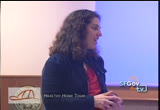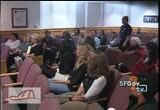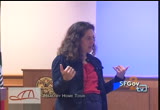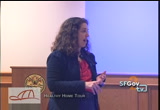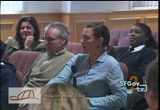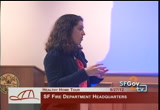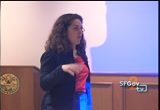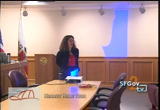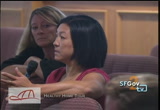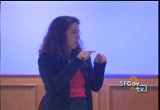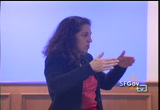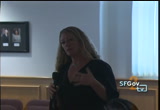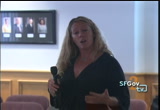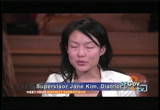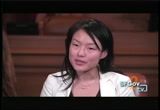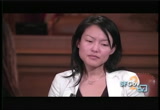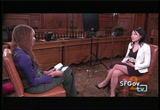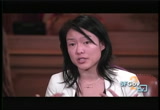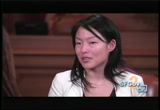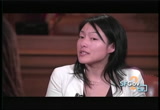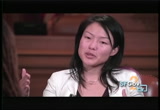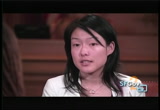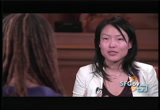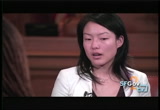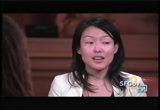tv [untitled] December 26, 2012 11:00pm-11:30pm PST
11:00 pm
so relatively short-term, but also somewhat higher heat exposure than what we probably get most of the time in san francisco, so conditions are really variable and then it's usually controlled rather than kind of normal. yeah? >> so, in general where possible, staying away from plastic water bottles is not only making your life a little bit healthier, it's decreasing our dependence on plastic which is more important as a broader environmental issue, but even water bottles, even if you leave them in a cold environment, you don't know where they've come from or they've been in ship holds which is really hot, just as a number one rule, if you smell something plastic don't drink out of it. >> that's good advice.
11:01 pm
>> i have two questions, they're a little bit unrelated but the first one goes on the scheme of plastic, so plastic wrap, plastic bags, you know, it's great to say we should all use glass but we know what's used out there is plastic, and it's reusable, you can come up with all these ways to avoid it but there's plastic everywhere and it's accessible and cheap, so plastic wrap gets used a lot, there aren't that many alternatives that can do what plastic wrap does, i don't use a lot of it and it's harder to store things long-term and same question applies for the freezer, it's easier to put things in a freezer bag. >> so, a little tip for that is i do admit to using plastic bags, i reuse them and if something is not -- i don't use them for liquids and if
11:02 pm
something isn't somehow already kind of like a solid or whatever, parchment paper around that and then use the plastic just as the thing that keeps it from leak-proof or if i'm taking soup to work, i have my soup in a glass jar but i will throw it in plastic because i don't want it all over my backpack and there's also more stainless steel options which are a little more expensive but that's a one-time investment, just don't lose it, so a box of plastic bags, it lasts me like three year, parchment paper, it's the layer that touches your food and then aluminum foil isn't really bad, but parchment paper is a good thing. >> plastics in kids toys and kids products, they're not
11:03 pm
really labeled, i don't find the same symbol on them and i do a lot of the reuse and recycle, but mostly reusing things so we have hand-me-downs and all kinds of toys that have been through many generations and i sometimes think about it, i can only worry so much about what my son puts in his mouth, but when you talk about chemicals, where do you start, besides i know wooden toys are best and that was the plan originally, only wood in our house and glass and ceramics, that's all lovely in theory, it's not what happens unless you're a waldorf parent and you're strict and it's really your principle, so good will has a lot of plastic, so you know, anymore words on that, i realize it's a matter of what you can do, but --
11:04 pm
>> i have not encountered some of those challenges because i'm not a parent but i have been around a lot of kids, important note is that in 2008, a law was passed that mra*s sites could not longer be used in kids toys , for right now, if you're buying new toys off the shelf, they're not going to have that particular compound, plus skish shi ones, they're not going to have that, i know you have a small child, is when they're at that mouthing stage of putting everything in their mouth, that maybe be the time to be most concerned about the specifics when they get to the older stage where, you know, there's some pretty nifty plastic toys out there, let's get real, and i like that i had legos as a
11:05 pm
kid and those were plastic, you know, maybe that's when you loosen it up a little bit and make, you know, judicious decisions, but when they're putting everything in their mouths, you want to be the most careful about what that is, parents may have other added tips. >> [inaudible] because most of the toys for kids, we don't really check sometimes where they're made. >> it's for toys sold in the united states, so regardless of where the manufacturer is, if they're sold in the u.s., they have to comply with those standards, other countries could well have different laws on their shelves and my guess would be vary from laws that would be more health protective to less fighters to join us. >> i have two questions, i'll keep them brief.
11:06 pm
we can't control where our fire houses are and our fire house is a block off the freeway, we do replace our h fact filters every five mother and is they're jet black when we replace them every three months, it is a big concern, how do we reduce our exposure when we're a block right off the freeway, we're bumper to bump traffic, and there are some fire houses that are literally underneath the freeway so how do we reduce that exposure, air filters, if so, what kind of air filters? >> you're getting beyond our technical knowledge of our filtration, but you know, it might be somebody to consult with somebody with expertise in air filtration for indoor air of course, maybe replacing those filters more often, you know, some very basic things and again, i'm not an engineer,
11:07 pm
but wiping down surfaces with moistures rather than a rag captures that better, otherwise you're containing it better, thinking about some of the basic things you do in the home, i would consult someone who has experience in air filters. >> [inaudible]. >> [inaudible] and my husband tells me they mop the apparatus floors every day because it's a diesel dust, i'm not sure if it's a common practice in fire houses, i was told someone in the fire department had developed cancer and they thought it was partly due to the diesel dust so they mop
11:08 pm
down every day, i know they probably sweep it but i don't know if mopping down is what 9 does, i don't know if this is company policy because i haven't been there. it is? okay. >> i have a question. my question is unrelated, talking about -- going back to the radiation and how bad it is for your body, so why do they recommend it as a treatment if someone has had cancer of various sorts? >> kind of because it can be toxic to cells and -- so, if you target it, right, and then you're directing it to those very cancer cells that are growing very rapidly and are in a very focal area, then you are, you know, -- and it's at a higher dose than you're exposed
11:09 pm
to when you're screening, you're killing those cells and you're stopping their growth, so they're leveraging that particular feature of the radiation just as they do with chemotherapy which is drugs that we won't have to take unless we're needing to kill those cancer cells. >> [inaudible] radiation? >> it is very focused >> even though the [inaudible] i was talking about, if it's focused, why does everybody leave the room? >> they're spending their 8 hour work day, and even if it's focused and there's a little bit of spread, radiation, as i understand, i'm not a physicist either, does reduce in its power the further away you get from it, right, that there's still, you know, if you're spending 8, 9 hours a day, you
11:10 pm
don't want that little bit added, they're getting better and better at in medical radiation when they're using it as a treatment, directing that ray to a more specific and localized area, but, you know, we do see in kids who are treated with radiation early -- for earlier childhood cancers that they can develop later life cancers as a result, now what's your trade-off there, the 20, 30 years of life they may have and maybe it's a treatable cancer they might get later, but if you're an adult and getting na, you're weighing the costs and benefits. >> i just wanted to say one thing about the -- a couple of things about the diesel fuel, christine brings a great thing about where your fire house is located but what are our practices in the fire house, and are your extractors plugged
11:11 pm
in when the rigs are on or they're plugged in and blowing into the apparatus floor and with some of our standing orders with the ambulances, i know for sure they're supposed to stay on all the time at a scene, you're at a house in an hour and your rig is supposed to be on outside, that's addressing some of those policies within our department, it's like, well, we're told you have to leave the rig running to keep the power up or something, well, come on now, you know, can't that not be changed a little bit, so i think that that is, you know, it's the diesel fuel we know is something cancer-causing, the other thing that came up with me is not a question but a comment with fire houses that i know and just starting to look and there's been some talk in our department, why do we have cell towers on our fire houses and there are some fire houses
11:12 pm
that have them and they're in places where it's exposing right where we sleep, why do -- why do we have that and is it a cost benefit thing, and just to start to ask some of those questions of our administration really, so that was it. >> so, i think that we are out of time, but this was wonderful, thank you for the rich questions and your attention and for bringing so many of you in here. >> i would like to thank bonnie and the breast cancer fund for coming and all of the local co-op that uses local ingredients, we practice what we preach.
11:13 pm
>> hello well concealed need your district supervisor. -- welcome to meet your district supervisor. we are here with supervisor kim. welcome. thank you for joining supervisor kim: thank you for having me. >> tell us where he grew up. supervisor kim: i grew up on the new york city. my parents immigrated to the u.s. i actually started becoming active in the community in high
11:14 pm
school. ed i went to stanford. -- i went to stanford. when i graduated, i move to san francisco. my first job, i started working developing economic policies for low-income communities statewide in california. i worked with young people, parents, families are around issues that concern our neighborhoods, whether it was communities, affordable housing, public schools, or just planning issues in neighborhoods like parks. i did that and actually ran for the board of education here in san francisco. i got a term on the school board working for families in our public school system and actually worked for the lawyers community and i came to the board of supervisors. >> why did you choose to live in
11:15 pm
san francisco? supervisor kim: you know, i do not know if i have a good answer for that. i just wanted to try it out. >> tell me what motivated your interest in politics. supervisor kim: that is a tough question to answer. i never had any intention to get involved in the electoral process. >> really? supervisor kim: i was always politically active. i was always working on statewide initiatives, and i worked on several campaigns. i worked as an organizer. i did not really have an interest in an electoral process, because -- i just have this perception the process was 30, and when i went to the ballot to vote, it looked like i
11:16 pm
was taking the better of two evils. i did not have a strong interest. working as an organizer, you get to know issues surrounding budget for schools or housing, and i began to see people were really accessible and some had started working with the community and we got more and more engaged. >> where do you place yourself on the political spectrum? supervisor kim: i think i definitely fall on the left. >> was there anything surprising about the campaign process? supervisor kim: it was my third campaign running for office. i ran for the school board twice before. in many ways, i was already -- i already knew what i had signed myself up for. it was physically grueling,
11:17 pm
emotionally grueling, really tiring. the one thing i enjoyed was i got to know voters and residents. you do not really get to do that when you run citywide. i enjoyed campaigning more because i had time to meet voters individually, and i loved it. i really enjoyed being out on the field. i spent all lot of time doing it. which i thought was important -- both for me because i get a deeper understanding of what people care about, and what people loved about the district and the city, and i think it was better for our community that i was out there one on one. >> what are the biggest issues for san francisco right now? supervisor kim: economic development. that is the biggest issue for san francisco and the country. our economy is not in the best
11:18 pm
place that it could be. we really do see that people want to see more jobs for everybody. second, it is probably a myriad of issues. for our district, and think public safety issues -- ranging from low-level crime to larger public safety issues. we held our first hearing on pedestrian public safety in district 6. we learned that san francisco has the highest rate of vehicle pedestrian collisions in the state of california, our rate that is higher than tokyo, london, other major cities. a costs are taxpayers every time we go to the hospital. we can do better. other cities are doing better than we are.
11:19 pm
that is an important issue we have the highest rate in the city, and you're probably higher than any other city. " we have spent on pedestrian safety over the last four years is close to $13 million. >> how to balance the needs of the district compared to the city? supervisor kim: it is interesting representing a district and a collection of neighborhoods. for me, it is interesting because i represent the city of san francisco. i mean you represent those who live in the district. i care very deeply about what is going on in terms of racial tension between asian and
11:20 pm
african american communities in the bayview or whether we're talking about muni were talking about public safety issues in other neighborhoods -- i think it is important for me to support the issue's going around the neighborhood. i think most san francisco residents do not identify themselves by their district. >> once again, the city is faced with tough budget decisions, including whether to raise taxes and fees or whether to make cuts. how will your approach these choices? supervisor kim: the budget is tough this year. even though our deficit is not as large as it has been, it is tough because we have made these cuts already, and did this point, we are cutting things we really do not want to cut. and it is painful. we will lose more potential
11:21 pm
services. we will also not be able to support our residents. we are looking at weekend meals for seniors. it is painful. i think we have to look at it as a combined approach. it has to be cut within city government that we can bear -- services that are less essential. second, you have to look at raising revenue in the city. i think it needs to be a combination. and third, need to be much better informed, and we have to ask our public employees to look at the budget. and they already have, but also to look back. it is a threefold approach to me. >> what are the city's housing
11:22 pm
needs him much of the board of supervisors to to address them? supervisor kim: it is tough, because we depend on the market to build housing for our residents we build at over 150% of the need. we are building over the need of the market rates. we are actually building at roughly 80% of that need. so, not bad, but not great. a lot of that has happened through the work of the board of supervisors, negotiating with developers to develop very low income housing for individuals who were formerly homeless. but as you start to look at the categories, a lower income and middle income folks, we're not building for that need at all.
11:23 pm
i think we need to do more to make sure we are supporting that type of housing. one initiative i started working on was a student teacher housing which is directly in that income, essential employee housing. we will be releasing an rfp, which is really exciting, because we want to keep people engaged. we have to push for more. need to pass another affordable housing bond. it has come up two more times, and i hope we have the political will to support that again. >> what are your ideas about dealing with the issue of homelessness? supervisor kim: homelessness is
11:24 pm
a tough issue. we have amazing organizations that run incredible centers and services, and also supports the board of housing for the formerly homeless. not just providing housing, but safe housing and services -- whether it is job training for drug rehab or mental health. there are two categories of homelessness. this is on the end of been able to afford to live in san francisco. that live paycheck to paycheck. when they do not get that next paycheck, they could be homeless the next week on that level, we need to continue to support economic development, support job creation, small businesses, the act would create 60% to 70% of the jobs in san francisco. we need to push legislation white -- like local hire, which
11:25 pm
is supervisor avalos's legislation. we demand that companies hire folks from our city. that is one end. we have to do what we can use to subsidize other essential services, whether it is transportation or public health, so people can afford to live in the city. then you have another category of homelessness, which is chronic homelessness. it is not just living paycheck to paycheck, but other issues like mental health or drug addiction. that is a much harder population to address. i think -- the district that i represent as many of the community organizations. it continues to be a pressing problem.
11:26 pm
>> where do you think the attics and mentally ill will go? supervisor kim: first of all, a ton of families live in the tenderloin. people do not realize this, but the tenderloin is a family neighborhood. it in not a proponent for cleaning up the tenderloin. i love the tenderloin. i love what it is right now. you know, i recognize that we have a diversity of folks who want to live there. i do not have a problem with people being out on the streets and socializing. it is part of the character of the neighborhood. i do not think the party is something we should criminalize. that being said, we cannot have open drug dealing. i do support a foot patrol.
11:27 pm
we are currently working with several organizations or have safe passages where we have high school students and adults in the neighborhood. but shockingly, one of the top issues is being hit by cars, more than getting harassed by neighbors. that is something we are working on as well, traffic issues, can turn some of those streets to be two-way. another thing that we are trying to push is actually getting some business incubators in the neighborhood, because there are a lot of people who want to open businesses that cater to the families who live there. we do not have a full-service gross restore in the tenderloin, but we do have a number of -- grocery store in the tenderloin,
11:28 pm
but we do have a number of small businesses. >> what is happening with crime in your district and hal is the police department doing? supervisor kim: it is a difficult issue. i probably interface with the police department every week because with such an incredible need from our police officers in our district, ranging from south beach to the tender line to the intermission. -- to the tenderloin to the inner mission. i want to see our officers on the street, walking the beat, and i want our small business owners to know who they are. i think that alone creates an atmosphere of safety that is really important. i'm really excited about the
11:29 pm
substation coming up to 63. i think we need to continue to provide social services in our district. it has to be a partnership with sfpd. >> what about community courts? supervisor kim: i visited the court it was modeled after, which is the red hook court in brooklyn. the judge will visit the apartments or the locations talked about in the case and he has evolved this relationship of trust with the neighborhood that think is really positive. i think we are th
99 Views
IN COLLECTIONS
SFGTV2: San Francisco Government Television Television Archive
Television Archive  Television Archive News Search Service
Television Archive News Search Service 
Uploaded by TV Archive on

 Live Music Archive
Live Music Archive Librivox Free Audio
Librivox Free Audio Metropolitan Museum
Metropolitan Museum Cleveland Museum of Art
Cleveland Museum of Art Internet Arcade
Internet Arcade Console Living Room
Console Living Room Books to Borrow
Books to Borrow Open Library
Open Library TV News
TV News Understanding 9/11
Understanding 9/11